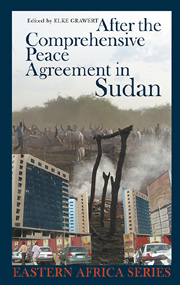Book contents
- Frontmatter
- Contents
- List of Tables & Figures
- Editor's Preface
- Notes on Contributors
- List of Acronyms
- Map of Sudan
- 1 Introduction
- I Implementation & Potential of the CPA
- II Challenges Facing Post-war Societies in Sudan
- III The CPA in its Sub-regional Context
- 11 Changes in Gambella, Ethiopia after the CPA
- 12 Ethiopian Federalism Seen from the Regional State of Gambella
- 13 From CPA to DPA
- 14 Challenges of Sub-regional Peace after the CPA
- IV Beyond the CPA
- Index
- EASTERN AFRICAN STUDIES
12 - Ethiopian Federalism Seen from the Regional State of Gambella
A Perspective from the Border Region
from III - The CPA in its Sub-regional Context
Published online by Cambridge University Press: 05 April 2013
- Frontmatter
- Contents
- List of Tables & Figures
- Editor's Preface
- Notes on Contributors
- List of Acronyms
- Map of Sudan
- 1 Introduction
- I Implementation & Potential of the CPA
- II Challenges Facing Post-war Societies in Sudan
- III The CPA in its Sub-regional Context
- 11 Changes in Gambella, Ethiopia after the CPA
- 12 Ethiopian Federalism Seen from the Regional State of Gambella
- 13 From CPA to DPA
- 14 Challenges of Sub-regional Peace after the CPA
- IV Beyond the CPA
- Index
- EASTERN AFRICAN STUDIES
Summary
Introduction
Federalism as a form of governance not only enjoys a good reputation in donor countries, but is becoming more and more popular in Africa. At first sight, federalism appears to be the best option for governance in an African context: federalism promises a method to deal democratically with a multitude of groups of diverse histories and identities within a given national entity. Accordingly, in the last decades many African states – South Africa and Ethiopia among others – have opted for a federal rather than a central allocation of power and structures of decision-making. Like other countries before – India, Belgium, Canada, and Spain, to name a few – they developed from unitary states as governments’ response to alleviate threats of secession by territorially clustered minorities. These ‘holding together’ federations (Stepan 1999: 24) are characterised by granting some sub-units particular domains of sovereignty, for example, over language and cultural rights in an asymmetric federation, while maintaining a broad scope of action for the central government and majorities.
Sudan has become the most recent and very specific example of an African federal system. The CPA and subsequently the interim national constitution and the interim constitution of southern Sudan (ICSS) define a decentralised system of governance (Arts 1 (2), 50 ICSS) in the attempt to cope with the exceptional diversity of Sudan's population in ethnic, religious, and linguistic respects. The view over the border to the Ethiopian regional state of Gambella may provide some lessons on the opportunities and limitations connected with the federal experiment in the neighbouring country.
- Type
- Chapter
- Information
- After the Comprehensive Peace Agreement in Sudan , pp. 212 - 231Publisher: Boydell & BrewerPrint publication year: 2010



